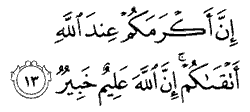True Superiority, Supreme Names, Love and Law
Issue 729 » March 15, 2013 - Jumada Al-Awwal 3, 1434
Living The Quran
True Superiority
Surah Al-Hujurat (The Chambers) Chapter 49: Verse 13 (partial)
 "Indeed, the most honourable of you in the sight of God is the most God-fearing of you. Surely, God is all-knowing, all-aware."
"Indeed, the most honourable of you in the sight of God is the most God-fearing of you. Surely, God is all-knowing, all-aware."
In some cultures, if one is aware of his "high birth," he is obliged to behave nobly. One of the blights of many societies is racism, when people feel and act superior simply because of their race. The Quran lays waste to false claims of superiority and states that the only rank that matters relates to one's relationship with God.
Many people are honoured by having lineage traceable to the Prophet, peace be upon him, and his family. While this is indeed an honour in itself, it is something to be venerated when one's actions are likewise honourable. It is said, "If your actions hold you back, your lineage will not speed you up."
Compiled From:
"Purification of the Heart" - Hamza Yusuf, p. 126
Understanding The Prophet's Life
Supreme Names
Abu Dawud and Nasai both related from Anas [ibn Malik] that he was sitting with the Prophet, peace be upon him, when a man, after offering his prayers, said in supplication: 'O God, verily, I ask You because Yours is all praise. There is no deity but You, the One who sends blessings, the Originator of the heavens and the earth. O You who are endowed with might and generosity. You who are the Living, the Vigilant.' The Prophet remarked, '[This man] has supplicated God through His supreme name: when God is called upon by it, He answers; when asked for something through it, He gives [what is asked].'
In this way, the Prophet is telling us that a supplication is answered when it is preceded by praise and remembrance, that this praise and remembrance are the Supreme name of God and that this is the most effective way for the servant to ask for his needs.
Compiled From:
"The Invocation of God" - Ibn Qayyim al-Jawziyya, p. 121
Blindspot!
Love and Law
The Shariah experiences no tension between 'love' and 'law' or between 'faith' and 'deeds'. Both are integrated into a harmonious whole.
Guiding people to the Din, the Way, through the Shariah is an act of God's greatest mercy, kindness and love. Wherever the 'sending down of the Book' is mentioned in the Quran, the attributes of mercy, wisdom and omnipotence are also mentioned.
The very distinction between love and law is alien to the temper of Islam and incomprehensible in its vision. Love is all-embracing; how can it even conceive of displeasing the Beloved and ignoring the guidance given by Him? How can One who loves His creatures leave them wandering and groping in darkness to find answers to the complex problem of life?
Compiled From:
Islam: The Way of Revival, "Inner Dimensions of the Shariah" - Khurram Murad, p. 194